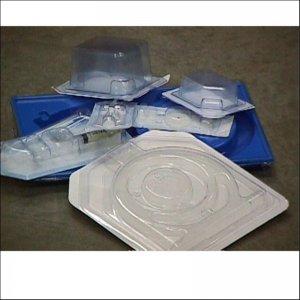
Plastics Coefficient of Friction (COF) Testing
Measuring friction can be important factor for many industries, especially for plastics and packaging. Friction can be characterized by static friction, and kinetic friction. Static friction of plastic is present when two objects are in contact but not sliding across each other. Kinetic friction is a resistance friction that is present during sliding motion between two objects. The coefficient of friction is dependent on the surface conditions of both materials that are in contact. Testing standards such as ASTM D1894 and ISO 8295 cover the testing methods to determine the coefficient of plastic materials. Testing involves pulling a weight with a plastic specimen between the weight and the ground. The force required to do so can be measured and a coefficient of friction is then determined. Testresources plastic coefficient of friction test equipment is modular and configured by our applications engineer to match your specific material, sample type and test method. Testresources product line includes a wide variety of test machines, test software, grips, test fixtures, extensometers, sample preparation aids, and environmental chambers.
ASTM D1894 Static and Kinetic Coefficients of Friction Plastic Film Sheet Test Equipment
ASTM D1894 covers determination of the coefficients of starting and sliding friction of plastic film and sheeting when sliding over itself or other substances. ASTM D1894 permits the use of a stationary sled with a moving plane, or a moving sled with a stationary plane.
ISO 11502 Blocking Resistance of Plastic Film and Sheeting
ISO 11502 describes a qualitative and a quantitative method for assessing the tendency of flexible plastics films and sheets to adhere to one another when left in contact for some time, at a specified temperature and under light pressure.
ISO 15359 Static and Kinetic Coefficients of Horizontal Plane Friction of Paper and Board
ISO 15359 specifies a friction-testing method based on the horizontal plane principle, and the procedure for the determination of the static coefficient of friction before, and static and kinetic coefficients of friction after, a specified amount of wear between the surfaces. It is applicable to paper and board.
ISO 5978 Blocking Adhesion Rubber Plastic Fabric Sheet Test Equipment
The ISO 5978 standard details the method for finding the blocking resistance of rubber-coated or plastics-coated fabrics or sheets. Blocking is the unintentional adhesion between two materials and can often occur between the sheets of plastics and rubbers on a roll. Properties of the material that are tested in this test are adhesive strength and the rating of the blocking which has three options that are defined in the ISO 5978 standard as No Blocking , Slight Blocking , and Blocking.
ISO 8295 Friction Plastics Film Sheeting Test Equipment
ISO 8295 specifies a method for determining the coefficients of starting and sliding fricition of plastic film and sheeting when sliding over itself or other substances. ISO 8295 is intended to be used for non-sticky plastic film and sheeting of up to approximately 0.5 mm thickness.
TAPPI T 549 Friction Test of Paper
TAPPI T 816 Coefficient of Static Friction of Corrugated and Solid Fiberboard - Horizontal Plane
This horizontal plane method is for the determination of the coefficient of static friction of corrugated and solid fiberboard or of the materials used to make such board. The horizontal instrument requires some means of movement of the specimen in relation to the surface upon which it rests. The coefficient of friction is measured directly from the resistance to that force and the applied weight. An inclined plane method is described in TAPPI T 815
